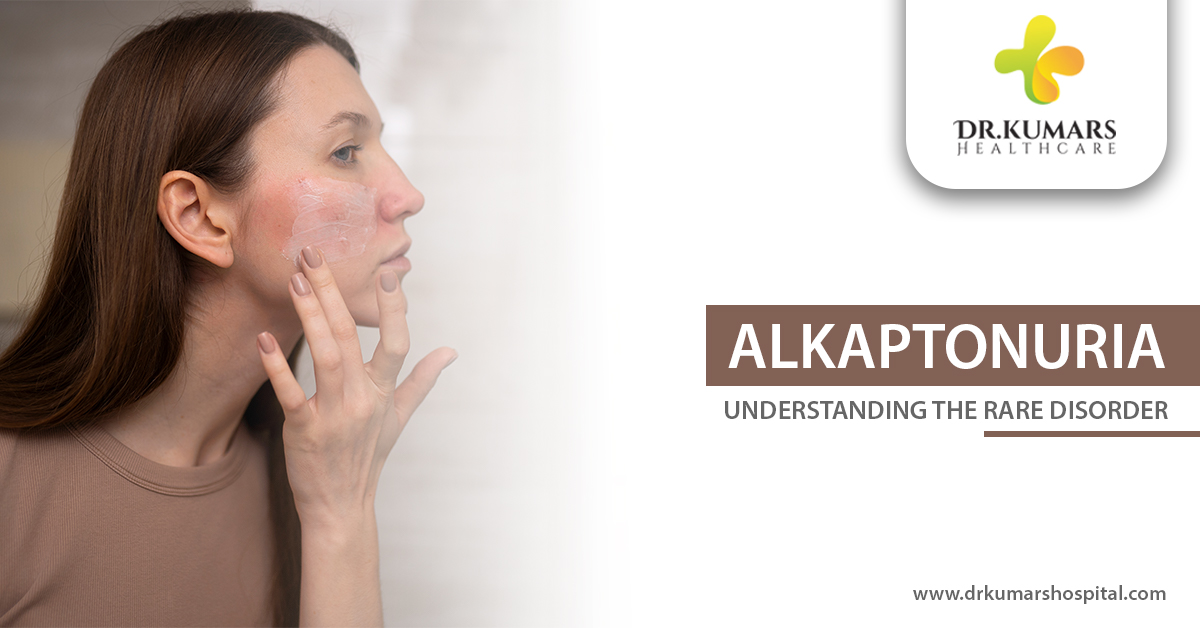Alkaptonuria: Understanding the Rare Genetic Disorder
What is Alkaptonuria?
Alkaptonuria is a rare inherited metabolic disorder that occurs when the body lacks an enzyme called homogentisic dioxygenase (HGD). Without this enzyme, a chemical called homogentisic acid builds up in the body. Over time, this causes darkening of bones and cartilage, joint stiffness, and early-onset arthritis.
One of the first noticeable signs is dark-colored urine when it is exposed to air. This rare condition often progresses slowly but can affect multiple organs and tissues if not diagnosed early.
Early Symptoms to Watch Out For
Alkaptonuria may not show symptoms immediately. However, as the condition progresses, the following signs may appear:
- Dark stains in a baby’s diaper
- Stiffness or chronic pain in the lower back, hips, or knees
- Blue or black ear cartilage and dark earwax
- Dark-coloured sweat or eye discoloration
- Formation of kidney or prostate stones
- Heart valve problems or shortness of breath later in life
These symptoms usually develop gradually and become more noticeable with age.
What Causes Alkaptonuria?
Alkaptonuria is caused by a mutation in the HGD gene. This gene controls the production of an enzyme responsible for breaking down homogentisic acid. When both parents carry the defective gene, their child has a chance of developing the condition.
Because the enzyme is missing, homogentisic acid builds up in the body’s connective tissues, resulting in joint degeneration, cartilage pigmentation, and tissue stiffness — a process known as ochronosis.
How Alkaptonuria is Diagnosed
Doctors may suspect Alkaptonuria based on clinical signs or patient history. Key diagnostic methods include:
- Urine test: Detects the presence of homogentisic acid.
- Genetic testing: Confirms the mutation in the HGD gene.
- X-rays and imaging: Reveal joint or spine changes similar to arthritis.
- Family screening: Recommended if there is a known history of the disorder.
Early detection allows doctors to manage symptoms effectively and reduce the risk of severe complications later in life.
Treatment and Management Options
There is currently no permanent cure for Alkaptonuria, but symptoms can be managed to improve mobility and comfort. Treatment options include:
- Anti-inflammatory medications to control joint pain and swelling
- Physiotherapy and exercise to maintain flexibility and prevent stiffness
- Avoiding high-impact activities to protect joints
- Surgical treatments such as joint replacement or heart valve repair in advanced cases
- Dietary management: Limiting foods high in protein may reduce homogentisic acid buildup
Researchers are exploring potential therapies that may help regulate enzyme activity and slow disease progression.
Possible Complications
If left untreated, homogentisic acid accumulation can lead to several complications:
- Severe arthritis in major joints such as knees, hips, and spine
- Heart valve hardening or coronary artery issues
- Tendon ruptures, especially in the Achilles tendon
- Kidney and prostate stones
- Skin pigmentation and stiffness in connective tissues
Timely diagnosis and continuous monitoring can help prevent these long-term complications.
Monitoring and Regular Check-Ups
For effective management, individuals with Alkaptonuria should undergo regular medical evaluations such as:
- Spinal X-rays to detect disk degeneration
- Chest X-rays or echocardiograms to monitor heart valve health
- CT or MRI scans to assess coronary artery and joint conditions
- Periodic urine and genetic tests to evaluate homogentisic acid levels
These check-ups allow early detection of complications and help doctors tailor personalized treatment plans.
Long-Term Outlook
People with Alkaptonuria can live a normal lifespan with proper care and monitoring. While joint and heart issues may occur over time, early lifestyle adjustments, consistent medical follow-ups, and physiotherapy can maintain a good quality of life.
Living a balanced life with regular low-impact exercise, a healthy diet, and avoiding smoking or alcohol can further improve overall well-being.
Why Choose Dr. Kumar’s Hospital for Alkaptonuria Treatment in Chennai
At Dr. Kumar’s Hospital in Chromepet, Chennai, we provide comprehensive care for rare genetic and metabolic disorders like Alkaptonuria. Our expert physicians specialize in early diagnosis, genetic counseling, and long-term management of complex diseases.
Here’s why patients choose us for rare disorder treatment in Chennai:
🔹 Experienced specialists in rare metabolic disorders
🔹Advanced imaging and diagnostic facilities
🔹 Personalized treatment plans for every patient
🔹Multidisciplinary approach — including orthopaedics, cardiology, and nephrology support
🔹 Compassionate care and continuous monitoring
Your health deserves expert attention — we’re here to support you at every stage of your treatment journey.
📞 Call: +91 80 150 170 11
🔗 Book Appointment: https://drkumarshospital.com/contact/
Take control of your health — get expert care for rare genetic disorders at Dr. Kumar’s Hospital, Chromepet, Chennai.


